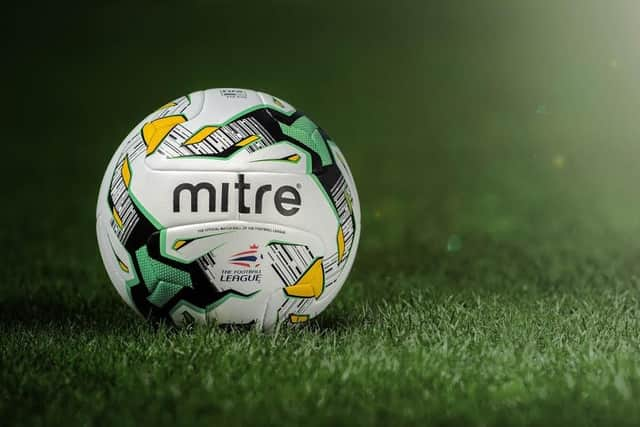Vigilance needed to ensure that we keep football drugs-free - Stuart Rayner
The relentless pace at which matches are played in this era of pressing and counter-pressing is something else, and although it is most pronounced in the Premier League, it filters all the way down the pyramid. If Leeds United’s intensity can still be exhilaratingly exhausting to watch now Marcelo Bielsa has been replaced by Jesse Marsch, so were Championship Barnsley under Valerien Ismael last season. League One Rotherham United still are under the watchful eye of fitness fanatic Paul Warne.
It is why the argument that millionaires should not complain about having to play three games a week when back in the day squads of 14 players would play 12 games in 10 days on mudbaths and still squeeze in five pints and a packet of Marlboro in the bar afterwards are nonsense.
Advertisement
Hide AdAdvertisement
Hide AdIt is why two of the greatest players of all time, Lionel Messi and Cristiano Ronaldo, are only able to bring their magic to bear sporadically in their twilight years. professional football has become a game played by truly formidable athletes.


When fatigue – or occasionally lack of focus – forces the intensity to drop, you really notice it.
Keeping up with the best must therefore be extremely difficult. But football managers, players and clubs do not want to just keep up, they are hard-wired to want to go past them.
It is why football needs to be every bit as vigilant in dealing with drug cheats as sports like athletics, cycling and swimming do. Yet it feels like it is lagging behind with cases very rarely reported.
Advertisement
Hide AdAdvertisement
Hide AdEven when Holland started playing Total Football and Valeriy Lobanovskyi inspired Eastern Bloc footballers to press as if their lives depended on it, there were mutterings about what players were putting into their bodies to create these Duracell-bunny performances.
Nutrition, sports science and injury prevention and treatment have improved beyond recognition never mind since then, just since the invention of the Premier League started opening minds and borders to global ideas but with every year the prices both of success and failure increase, so it is only natural the temptation to cut corners will too.
It makes it vital the authorities are on the case not just to ensure the current generation are keeping the rules, but to deter those that come later. An investigation by the Mail on Sunday makes you wonder if they are not asleep at the wheel.
It has never felt like drug-taking has been taken all that seriously in English football, especially of the performance-enhancing variety. Cocaine use by supporters seems to be the focus now.
Advertisement
Hide AdAdvertisement
Hide AdMiddlesbrough’s Abel Xavier was the first Premier League player banned for non-recreational drug use when he tested positive for dianabol after a 2005 UEFA Cup tie but much of what happens is hushed-up, which is why the newspaper’s investigation did the game such a service.
Using the Freedom of Information Act, and after much dragging of feet by the authorities, they discovered 15 Premier League players had been caught taking drugs between 2015 and 2020, 12 for performance-enhancing substances. That is either reassuringly low or worrying low depending on your viewpoint but what was alarming was that not one was banned.
At the same time, 15 of 24 non-Premier League players across Britain were suspended, three for four years.
Certainly lack of resources is not an excuse if there is a lack of rigour in catching any cheats.
Advertisement
Hide AdAdvertisement
Hide AdAfter a solitary positive case, for cocaine use, in 2015, the next four years saw Premier League cases rise each time until 2020 when lockdowns and pandemics made testing much more problematic and there was only one positive.
Most were excused as accidental or by therapeutic use exemption. Some can be used for perfectly reasonable reasons, such as anti-inflammatories or in cancer treatment. One of the drugs found in 2019 was indapamide, which doubles as a masking agent for banned substances.
Of 88 cases from 2013 to 2020, the UK Anti-Doping agency refused to give details of 49 because they were either of social drugs not banned by the Football Association, taken by minors, or because it could compromise investigations. Maybe there is no problem. Maybe all Premier League footballers have watched enough documentaries and read enough articles about Diego Maradonna that not one of them has taken cocaine since 2015.
Maybe Professor Ivan Waddington’s claims two years ago that cocaine and marijuana use were widespread were just wrong. Maybe none of them has taken performance-enhancing drugs, except 12 times for perfectly legitimate purposes.
Advertisement
Hide AdAdvertisement
Hide AdMaybe those who accuse football of not taking the issue seriously enough are misguided.
But it seems unlikely.
That it took so much digging to even learn what we did is not a great advert for the transparency without which wrong-doing can thrive. As well as acting as a deterrent, more openness would also be a reassurance for supporters.
Watching impressive feats of speed and stamina by footballers who can also manipulate a football brilliantly is an uplifting experience. But we need to know we can trust it is clean too.
Comment Guidelines
National World encourages reader discussion on our stories. User feedback, insights and back-and-forth exchanges add a rich layer of context to reporting. Please review our Community Guidelines before commenting.